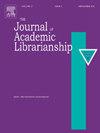AIGC背景下中国高校图书馆人工智能素养讲座现状调查
IF 2.3
3区 管理学
Q2 INFORMATION SCIENCE & LIBRARY SCIENCE
引用次数: 0
摘要
本文选取2025年QS世界大学排名前40名的高校(包括41所并列高校)和42所“双一流”高校图书馆作为研究对象,对其人工智能素养讲座培训活动(包括讲座、研讨会等)进行实证研究。通过定量统计(活动名称、主办单位、受众特征、组织形式等结构化数据)与定性分析(讲座培训内容文本挖掘)相结合,系统考察高校图书馆人工智能素养讲座培训现状。研究发现,中国“双一流”高校图书馆在人工智能素养讲座培训方面存在以下突出问题:重视程度和实施力度参差不齐,图书馆员参与度低,讲座培训主要依靠馆外教师,讲座培训内容不平衡,缺乏AI认知和AI伦理,AI讲座培训缺乏系统性,AI技能教育与实际应用脱节。基于国际比较视角,本文提出八大优化策略:加强对人工智能素养讲座培训的重视和实施,为图书馆员提供持续的人工智能素养讲座培训,加强人工智能素养图书馆员的建设,完善人工智能讲座培训内容,加强人工智能认知和人工智能伦理教育,建立人工智能工作坊系列;实现系统、全面的培训,增加AI实践组件,举办基因AI研究咖啡馆,并与多家机构合作举办AI讲座培训,为全球高校图书馆AI素养教育体系的创新发展提供实践参考。本文章由计算机程序翻译,如有差异,请以英文原文为准。
A survey on the current status of AI literacy lectures in China’s university libraries under the AIGC background
This paper selects the top 40 universities in the 2025 QS World University Rankings (including 41 tied universities) and 42 “Double First-Class” university libraries in China as research objects, and conducts an empirical study on their AI literacy lecture training activities (including lectures, seminars, etc.). By combining quantitative statistics (structured data such as activity name, sponsor, audience characteristics, and organizational form) with qualitative analysis (text mining of lecture training content), the current status of AI literacy lecture training in their university libraries is systematically examined. The study found that China’s “Double First-Class” university libraries have the following prominent problems in AI literacy lecture training: the degree of attention and implementation strength are different, the participation of librarians is low, lecture training mainly relies on teachers outside the library, the lecture training content is unbalanced, there is a lack of AI cognition and AI ethics, AI lecture training lacks systematicness, and AI skills education is out of touch with practical applications. Based on an international comparative perspective, the paper proposes eight optimization strategies: Strengthen the emphasis and implementation of AI literacy lecture training, provide continuous AI literacy lecture training for librarians and strengthen the construction of AI-Literate librarians, improve AI lecture training content and strengthen AI cognition and AI ethics education, establishing the AI workshop series: achieving systematic and comprehensive craining, increase AI practice components, holding geneAI research cafe, and cooperate with multiple institutions to organize AI lecture training, in order to provide practical reference for the innovative development of AI literacy education system in university libraries around the world.
求助全文
通过发布文献求助,成功后即可免费获取论文全文。
去求助
来源期刊

Journal of Academic Librarianship
INFORMATION SCIENCE & LIBRARY SCIENCE-
CiteScore
5.30
自引率
15.40%
发文量
120
审稿时长
29 days
期刊介绍:
The Journal of Academic Librarianship, an international and refereed journal, publishes articles that focus on problems and issues germane to college and university libraries. JAL provides a forum for authors to present research findings and, where applicable, their practical applications and significance; analyze policies, practices, issues, and trends; speculate about the future of academic librarianship; present analytical bibliographic essays and philosophical treatises. JAL also brings to the attention of its readers information about hundreds of new and recently published books in library and information science, management, scholarly communication, and higher education. JAL, in addition, covers management and discipline-based software and information policy developments.
 求助内容:
求助内容: 应助结果提醒方式:
应助结果提醒方式:


